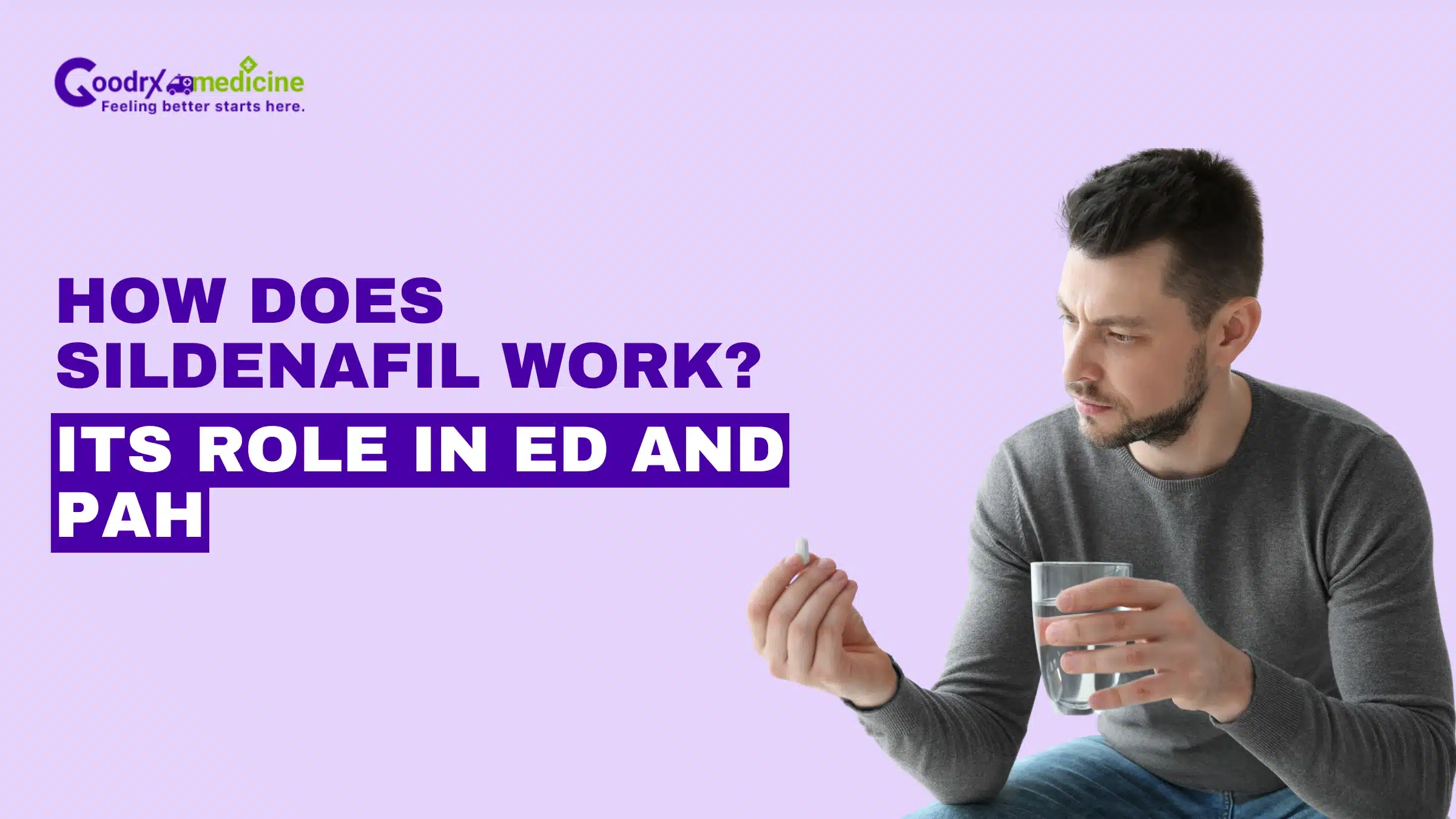Sildenafil is a widely known medicine used for treating Erectile Dysfunction (ED) in men and Pulmonary Arterial Hypertension (PAH). It is often sold under brand names like Viagra for ED and Revatio for PAH.
While it has become a common treatment, many people do not fully understand how does Sildenafil work in the body.
This article explains the working mechanism of Sildenafil in clear and simple terms. It covers how the medicine improves blood flow, what happens in the body after taking it, and why it is effective for treating certain conditions.
Whether you’re a patient, a caregiver, or someone who wants to learn more about this medicine, this article will help you understand everything you need to know about Sildenafil.
How does Sildenafil work for ED?
Sildenafil is a part of a group of medicines called Phosphodiesterase type 5 (PDE5) inhibitors. PDE5 is an enzyme found in many parts of the body, especially in the penis, lungs, and blood vessels.
Sildenafil does not cause an erection on its own. Instead, it supports the natural process of achieving an erection by blocking the PDE5, which breaks down cyclic Guanosine Monophosphate (cGMP) too quickly.
Here’s what happens after taking Sildenafil:
- Sildenafil blocks PDE5, stopping it from destroying cGMP.
- This leads to increased cGMP levels in the body.
- More cGMP means better relaxation of muscles and wider blood vessels.
- This leads to more blood flow into the penis during sexual stimulation, resulting in a stronger and longer-lasting erection.
Important note: Sildenafil only works when there is sexual stimulation. It will not cause an erection if the person is not aroused.
How quickly does Sildenafil work?
Sildenafil starts working within 30 minutes to 60 minutes after taking it. For some people, it can start working in as little as 15 minutes. Its effects can last for up to 4 hours, but this doesn’t mean the erection will last the entire time. It simply means the body remains ready for sexual activity during that period.
How does Sildenafil work for Pulmonary Hypertension
In PAH, the blood vessels in your lungs get narrow, making it difficult for the heart to pump blood. This leads to symptoms like tiredness, shortness of breath, and chest pain.
Sildenafil helps by:
- Relaxing the muscles in the lung arteries.
- Widening the blood vessels in the lungs.
- Lowering blood pressure in the lungs.
- Improving the ability to exercise and perform physical activities.
By reducing the pressure in the lungs, Sildenafil makes it easier for the heart to pump blood and reduces the symptoms of PAH.
How is Sildenafil taken?
Sildenafil for ED is usually taken as needed, about 30-60 minutes before sexual activity. For PAH, Sildenafil is often taken as a daily dose, usually three times a day, at regular intervals.
Dosage varies depending on the patient’s age, health condition, and other medicines they may be taking. It is important to follow the doctor’s advice carefully.
What affects Sildenafil’s effectiveness?
Several factors can influence how well Sildenafil works, including:
- Alcohol: Drinking too much alcohol can reduce blood flow and make it difficult to get and keep an erection, even with Sildenafil.
- Food: A heavy or high-fat meal can delay the absorption of Sildenafil, making it take longer to work.
- Health conditions: Diabetes, heart disease, and nerve damage may reduce its effectiveness.
- Other medications: Certain medicines (like nitrates) can interact dangerously with Sildenafil.
Possible side effects
Like all medicines, Sildenafil can cause side effects in some people. Common side effects include:
- Headache
- Flushing (warmth or redness in the face)
- Indigestion
- Nasal congestion
- Dizziness
- Blurred vision or sensitivity to light
Most Sildenafil side effects are mild and go away on their own. However, serious side effects like loss of vision, chest pain, or an erection lasting more than 4 hours require immediate medical help.

Conclusion
So, how does Sildenafil work? Sildenafil plays a vital role in improving blood flow where it matters most, whether in the penis for treating Erectile Dysfunction or in the lungs for managing Pulmonary Arterial Hypertension.
By blocking the PDE5 enzyme, it preserves cGMP levels in the body, allowing smooth muscle relaxation and better circulation. While it does not create sexual desire or act as a stimulant, it enhances the body’s natural response to arousal in men with ED and relieves pressure in the lungs in those with PAH.
Taken as prescribed and under proper medical guidance, Sildenafil will help improve the quality of life for many patients. Understanding how it works helps ensure its safe, effective, and confident use.
Frequently Asked Questions
Can older adults safely use Sildenafil?
Yes, older adults can use Sildenafil, but with caution. They may be more sensitive to its effects and more likely to have underlying conditions or take medications that interact with it. A lower starting dose is often recommended. Always consult a doctor before use in older age.
Is it safe to use Sildenafil long-term?
Yes, long-term use of Sildenafil is generally considered safe if prescribed and monitored by a doctor. However, regular check-ups are important to ensure your heart, liver, and kidney functions are stable. Do not self-medicate or rely on Sildenafil without proper medical follow-up.
Is Sildenafil addictive?
No, Sildenafil is not addictive. However, some men may become psychologically dependent on it. They may feel they cannot perform sexually without taking the pill, even when it’s not medically necessary. Open communication with a doctor can help with this.
Does Sildenafil affect fertility in men?
No, Sildenafil does not directly affect sperm count or quality. It helps improve erectile function, which may indirectly support conception by enabling intercourse. However, it is not a fertility drug and should not be used solely for that purpose without consulting a fertility specialist or urologist.
When referencing outside resources, GoodrxMedicine always provides full citations. To learn more about the measures we use to maintain the quality of our content, please review our Content Information Policy.















